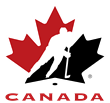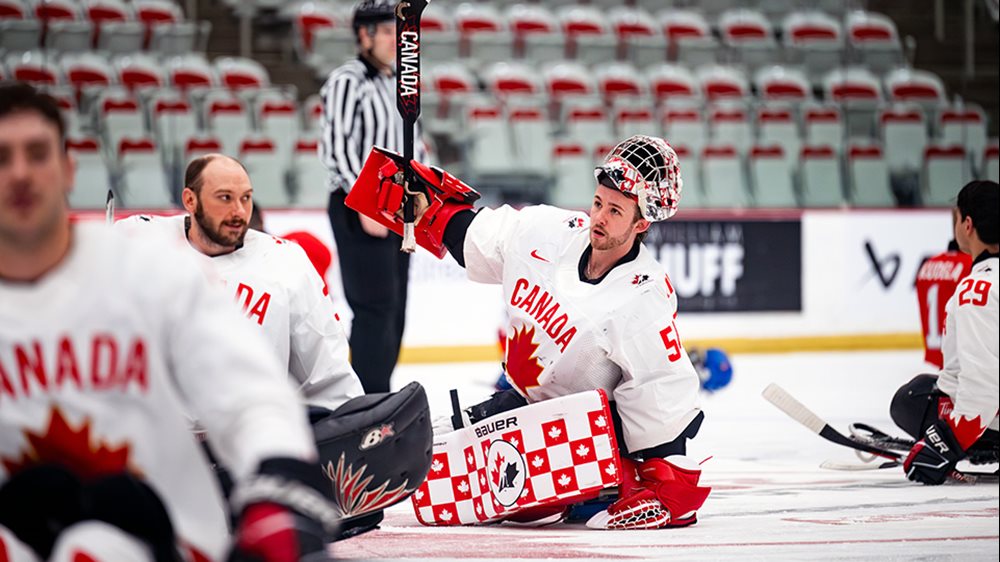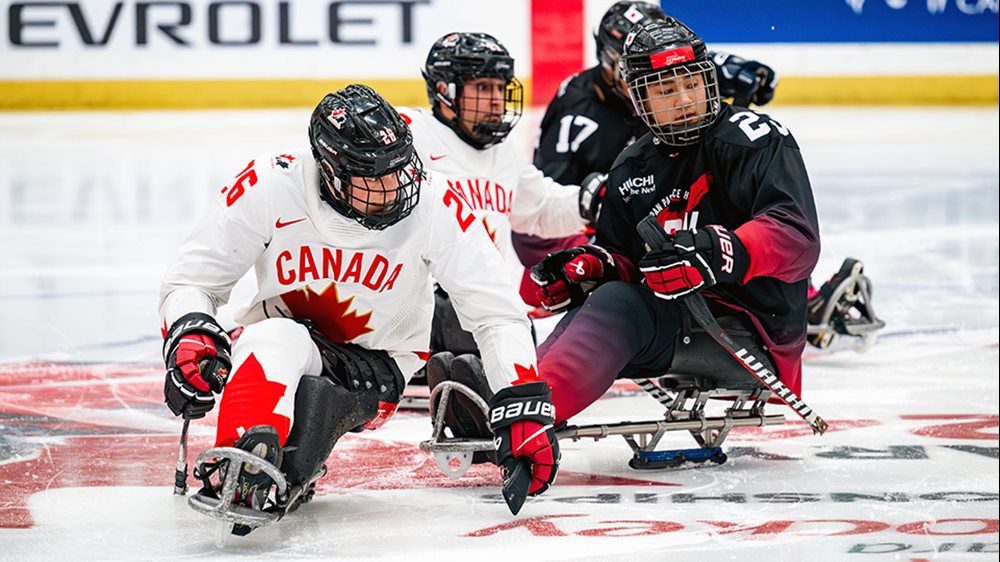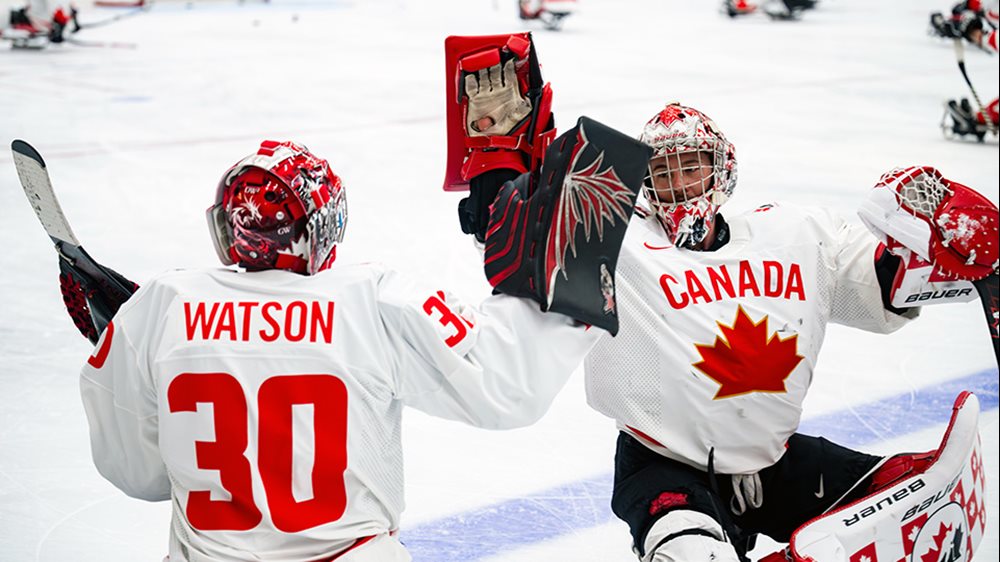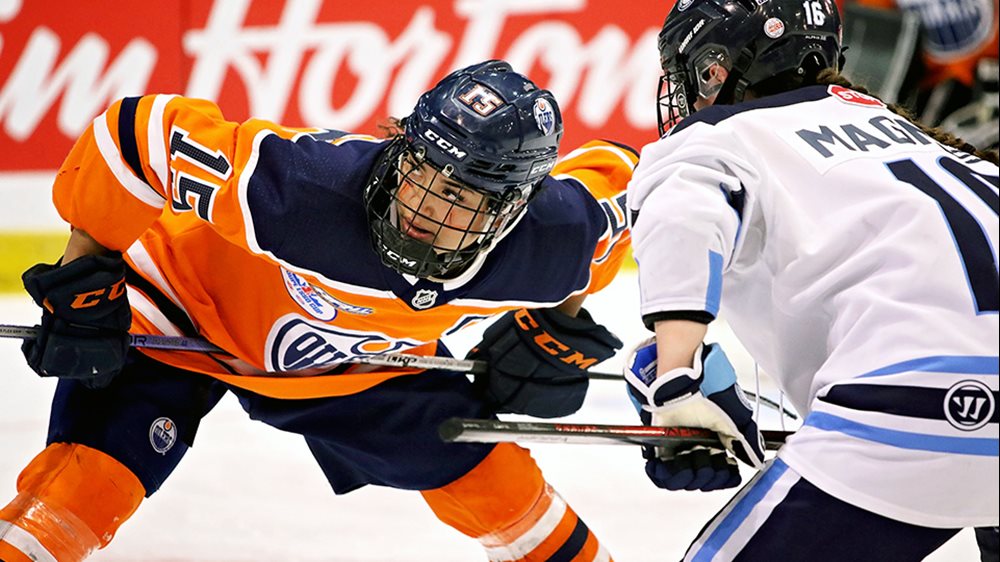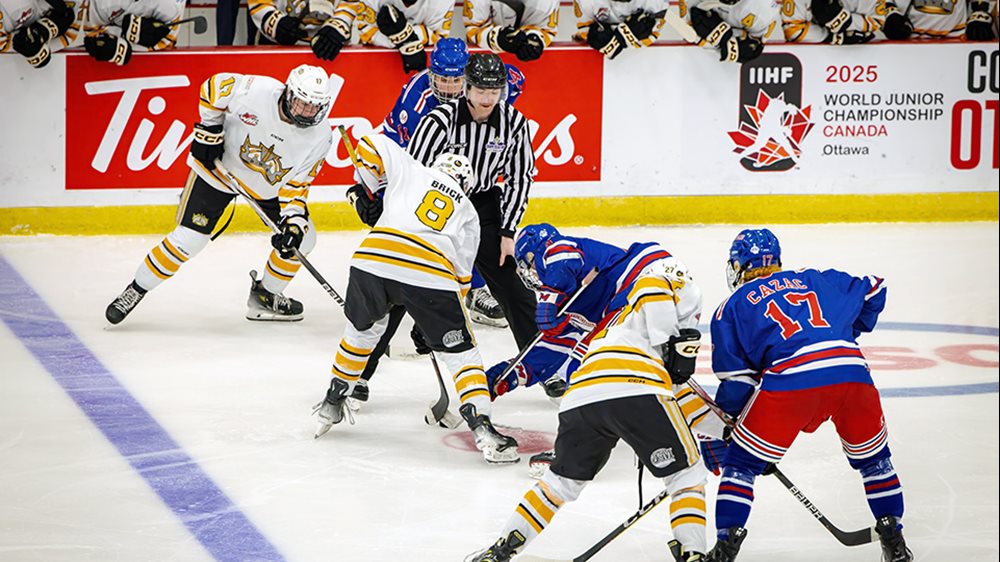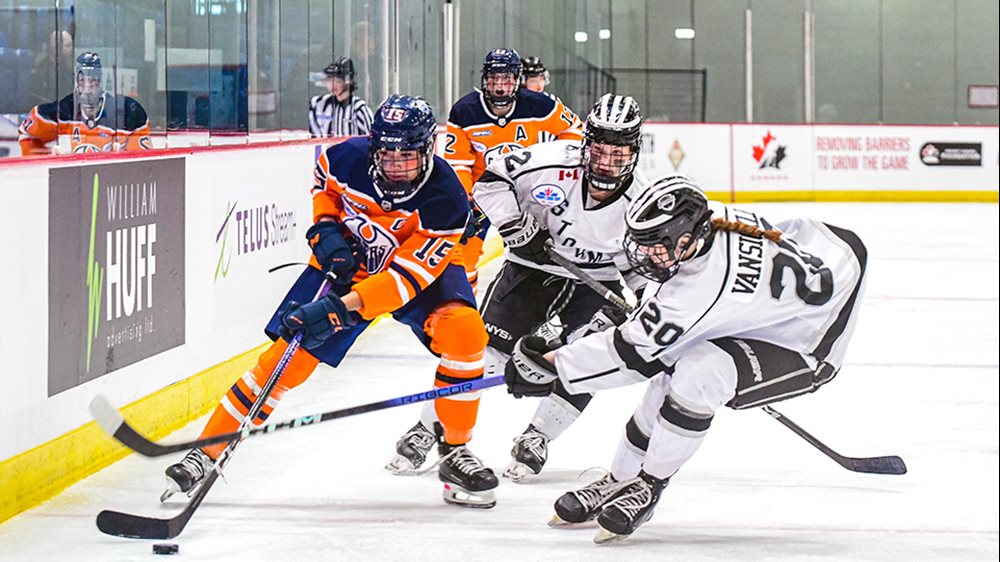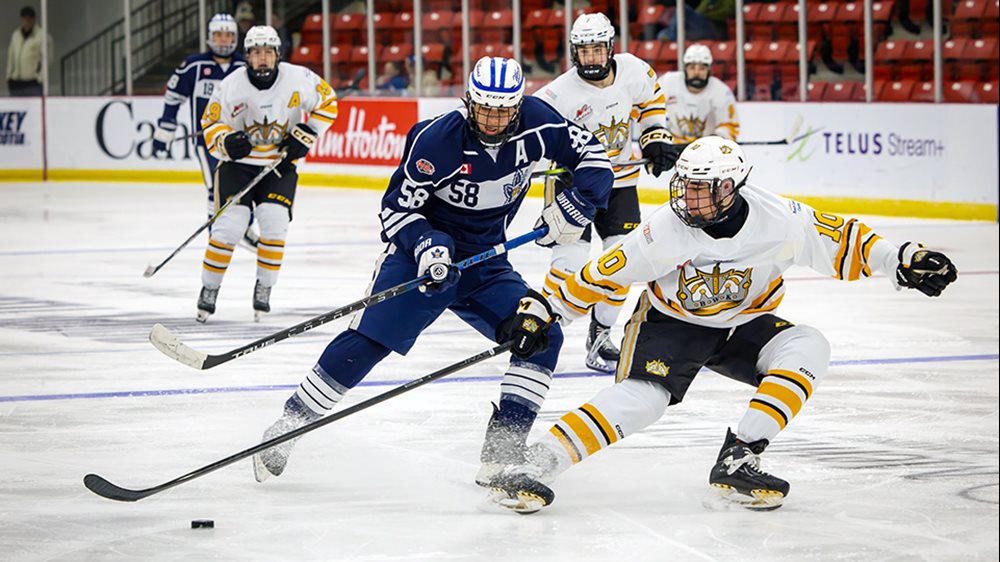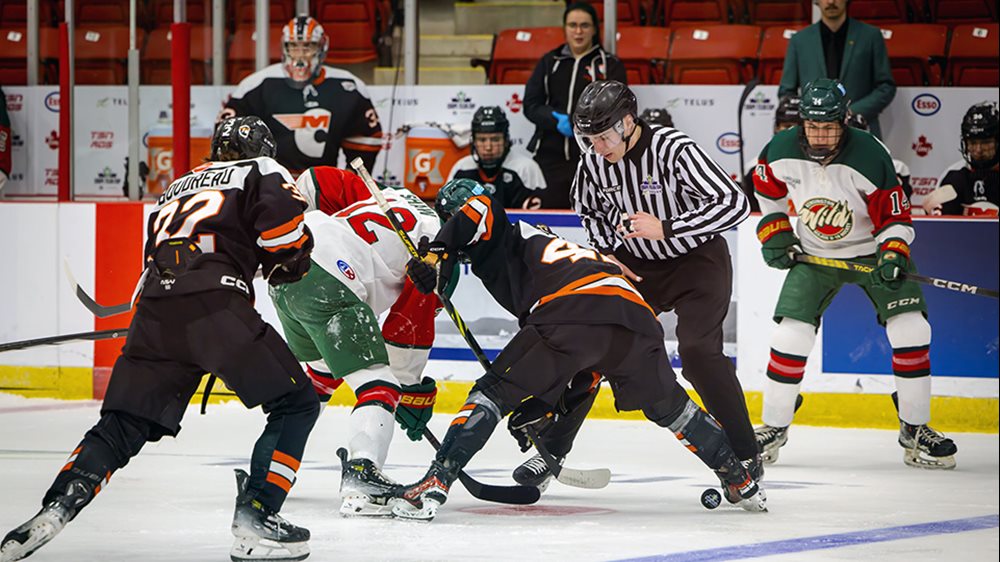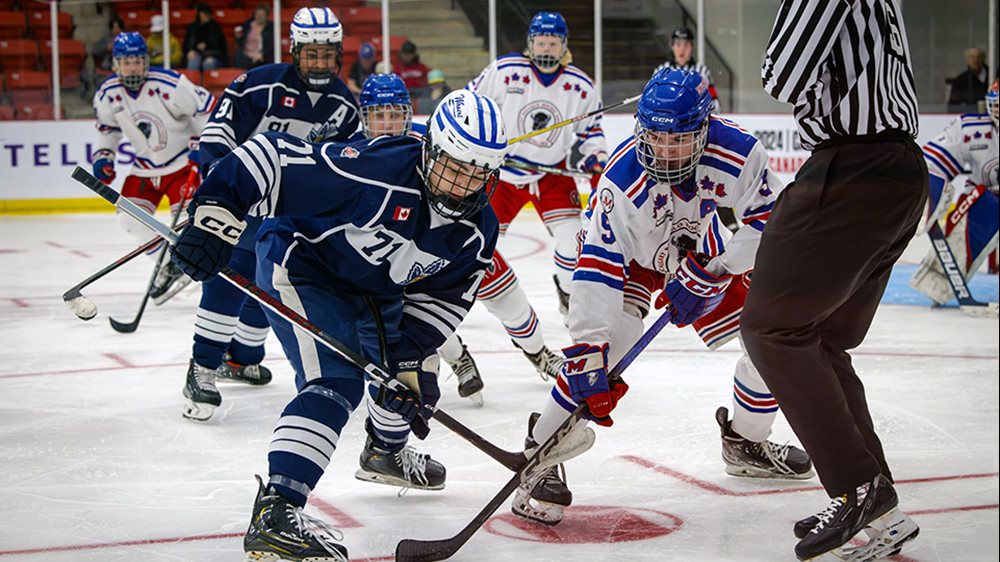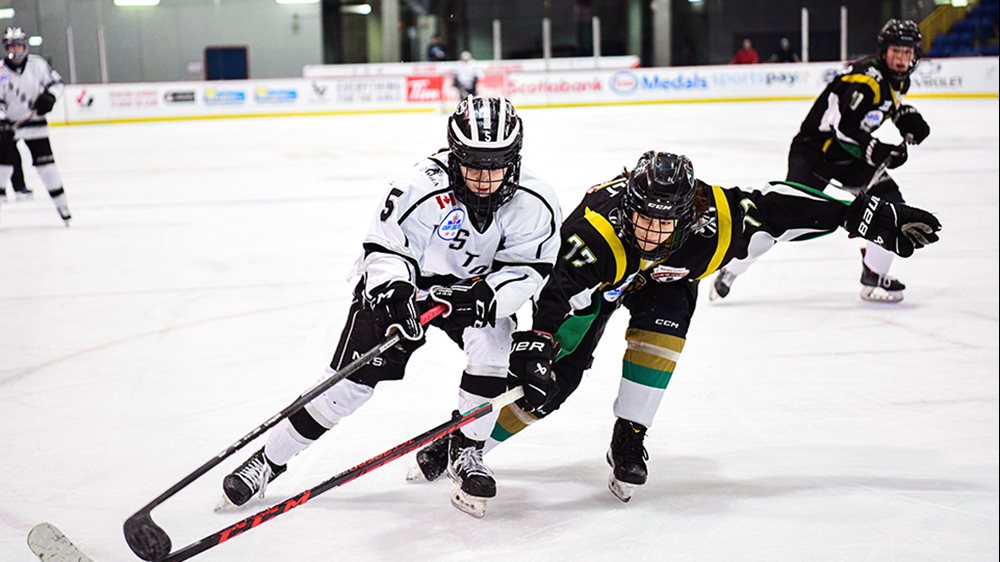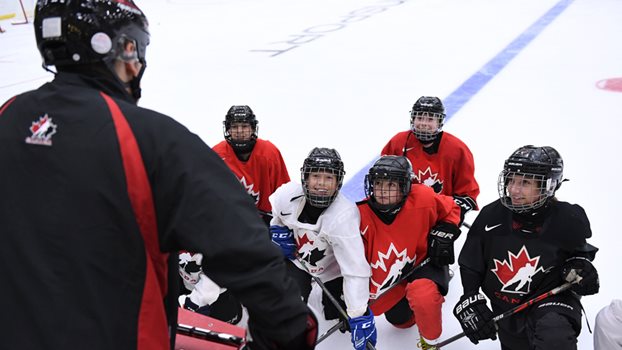
Returning to the rink
After a 2020-21 season full of uncertainty, the return to a sense of normalcy for local hockey associations and Hockey Canada Skills Academies is cause for excitement
There’s excitement buzzing around rinks from coast to coast to coast. Skates are freshly sharpened, sticks are newly taped and Canadians are celebrating the return of hockey.
After a season full of uncertainty last year, the return to a sense of normalcy is a welcomed sight for local hockey associations and Hockey Canada Skills Academies (HCSA).
“There’s tournament planning going on and exhibition games going on. Everybody’s just excited to get going,” says Trevor Hanley, a U18 AA coach from Martensville, Sask.
All the programs in Dave Tressor’s school board in Kenora, Ont., were not able to run last year due to the COVID-19 pandemic. With the return of our game, the program at Beaver Brae Secondary School is set to be reinstated in February.
“We’re so excited to have an opportunity to get the academy back and get the students going again,” says Tressor, who is the vice-principal at Beaver Brae.
In Athabasca, Alta., 2020 was supposed to be the inaugural year of its HCSA at Edwin Parr Composite School. The anticipation has grown over the extended start date, but the wait has paid off for the Grade 8 and Grade 9 students.
“Anytime somebody talks to me about hockey academy, I get the stupidest grin on my face because I’m just so excited,” says assistant principal Brenna Liddell. “I’m like a kid on Christmas Day, it’s so exciting. Our kids are having a great time and our parents are really adjusting well.
“I spent two weeks before November break meeting with each of our kids that are in it. We talk about academics, we talk about attendance and then I say, ‘Hey, tell me how hockey academy is going,’ and every single kid smiles and says it is the best thing in the world.”
For Porter Creek Secondary School in Whitehorse, Y.T., it was able to run its HCSA last year, but it focused mainly on skill development due to the restrictions from COVID-19 safety guidelines.
“I think [the students] are excited about the fact that they can do more gameplay [this season],” says Amy Vermeulen, the lead instructor at Porter Creek.
The program at Porter Creek runs in the second semester of the school year, but the buzz about the return of a more normal hockey program is already affecting the students.
“I see a few of them all the time in the halls,” Vermeulen says. “They talk about how excited they are to just get the semester over so they can start the hockey program.”
Local hockey associations across the country are also looking forward to getting back to a sense of normalcy. In Prince Edward Island, teams are back on the ice, but the main difference this season is the amount of time teams are allowed at the rink before practices or games.
Blaine Fitzpatrick, a Charlottetown Minor Hockey coach for the U15 AAA female team, knows the socialization before hitting the ice is beneficial for his team.
“They just wanted to get back to the way it was, be able to hang out, have some fun and chit-chat beforehand. We’re getting closer to that, we’re allowed in 30 minutes before now on a consistent basis, so that gives them that fun time at the rink,” Fitzpatrick says. “The excitement level is much higher because of the opportunity to potentially have a normal season as it was before COVID.”
One thing players in Yellowknife, N.W.T., are looking forward to is the return of tournaments.
“We generally get to play against the other smaller communities,” says U7 assistant coach Patricia Parker. “They come here, we go there and then we get to see a little bit of the town, they get to go to the swimming pools, and that’s the one thing they’re really missing right now.”
Hanley says everyone is back on the ice in his association, with U7 through to U11 teams practicing while U13, U15 and U18 teams have already started league play or are gearing up to begin. Last year, Saskatchewan teams were able to practice throughout the season, but they were limited to eight players on the ice at one time.
“It stretched a lot of guys to be creative and keep it innovative and exciting for the kids, so they’re excited to get back to full teams, working with everybody at once and certainly having the opportunity to coach in games,” Hanley says.
Creativity and adaption have certainly flourished over the past 18 months. With locker room restrictions in Yellowknife, Parker had to adapt to helping her young players get ready.
“They came fully dressed, but we had to tie their skates, untie them and bring them back to the parents,” she says. “We actually got to bond with them more because you got to talk to each kid as you were tying their skates and get to hear what they did on the weekend, or they would tell you what they had for dinner.”
Inspired by the NFL, Fitzpatrick created a playbook with all the team’s basic coverage systems last season so each player on his team can review it whenever they please.
“We don’t have as much time at the rink to go over lines with the group, so [each player] has that in a booklet at home,” he says. “They can spend their own time getting familiarized with that aspect of the game.”
Despite the uncertainties and challenges the pandemic brought, communities from coast to coast to coast are looking forward to using hockey to promote an active lifestyle.
“Mental health was a real concern, and I think this concern was not only throughout the province, but throughout the country,” Tressor says. “The hockey academy program provides a great avenue for students to exercise and get back and socialize again.”
Now that Our Game is Back, everyone is ready to get back to playing the game they love.
“It’s nice to see that they’re going to hopefully have a normal rest of their minor hockey careers and be able to enjoy their time at the rink with their friends,” Fitzpatrick says. “They’re going to work hard and develop, and you never know, maybe give themselves some opportunities down the road. I’m really excited for the kids.”
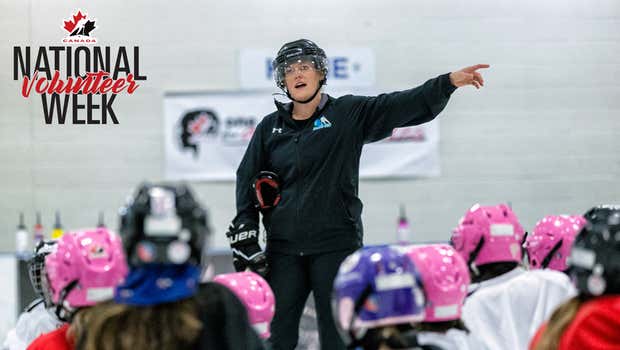
Making an impact in the North
A game-changer in women’s hockey, Kaylee Grant tirelessly gives her time across the territories, volunteering to ensure opportunities exist for women and girls
The first thing Kaylee Grant did when she moved to Yellowknife was find a hockey team.
The operating engineer took a one-year term to gain experience in her industry. Twelve years later, she’s still in the Northwest Territories and hockey has been a reason why she calls it home.
“You gravitate to what you know, and I knew sports,” Grant says. “When you join a sport, you instantly have 17 friends and a group where you feel accepted through a common goal and interest. When I moved to the North, I didn’t know how else to meet friends, so I went to the rink right away.”
Grant grew up around the rink in Antigonish, Nova Scotia. The community was also a hockey hotbed, supporting its Junior A, Junior B and university teams. Being around that passion and community made hockey an important part of her life.
“Playing hockey is what we did,” Grant says. “The community rallied behind our teams and the rinks were full, the atmosphere was great, and hockey was so prominent.”
She played minor hockey in Nova Scotia before moving to Newfoundland and Labrador to play at Memorial University. At 23 years old, she made the move to Yellowknife and knew she would find her community inside a rink.
“I find that the easiest thing to do when you come to a new place to meet people is through sport,” she says. “With joining a hockey team, I was already creating a group of people that were like-minded in interests and similar age. Plus, there are so many opportunities in the North to grow as coaches, players and mentors that have been so helpful.”
Grant’s love for the game wasn’t just as a player—she expanded her knowledge
by getting into coaching while in Nova Scotia. She started as an off-ice
coordinator with the Antigonish Bulldogs women’s under-18 team.
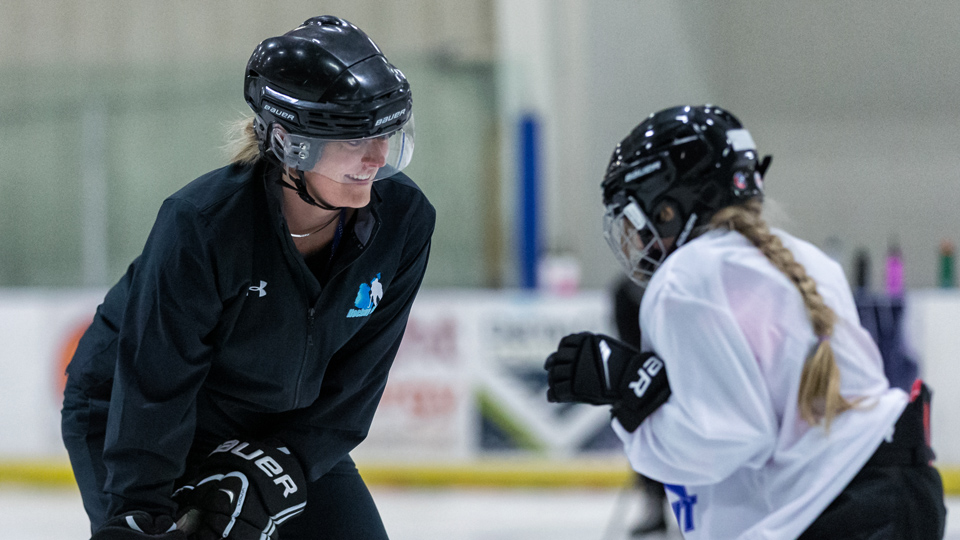
She did her Coach Development 1 training before getting her High Performance 1 training and evaluation certification. She continued to pursue additional coaching certification and training over the years to educate herself and give back to her community.
“I think seeing the female game continuously grow and develop that keeps me interested,” Grant says. “I love to see the progress in my players. I love seeing these players grow and adapt as individuals. Seeing them get involved in coaching is the coolest part.”
Her coaching philosophy is to develop a player’s passion for the game, be a role model and create an environment that is positive for women and girls.
Coaching and mentoring young girls are important to Grant, and she saw that path was through high-level opportunities, particularly by becoming a facilitator to drive more players into the coaching route. She has been working with Hockey North and the Hockey Canada Women Master Coach Developer program, which is focused on removing barriers to coaching education for women.
“Kaylee has volunteered at pretty much every level and she’s getting more involved with training coaches and being a clinician, which is an amazing progression for her,” says Kyle Kugler, executive director of Hockey North and a close friend of Grant. “She’s a great ambassador for hockey by giving back to other coaches through her experiences and helping with their development.”
Through being a volunteer coach, Grant has been able to experience some highlights with her teams, including as head coach for the Arctic Winter Games and Canada Winter Games, and as an assistant coach for Team North at the National Aboriginal Hockey Championship.
“Hockey North has given me so many opportunities and having that support has impacted me as a coach,” Grant says. “I enjoyed every year with those territorial teams and those experiences are a very big reason why I stay here – the coaching opportunities and knowing that we continually have room to grow.”
Another event that Grant was a key volunteer for was the inaugural One For All festival held in Yellowknife in February. It was a four-day event for women and girls from across the N.W.T. and Nunavut that included goaltending clinics, on-ice scrimmages and other off-ice experiences. The event was launched in partnership with Hockey Canada and Hockey North to celebrate the sport and grow grassroots hockey in the North.
“Kaylee is one of our co-leads in the North, and when we set out to deliver this programming in Yellowknife, it was a no-brainer that she would be involved. And typical Kaylee, she just runs with a task and completely owns it,” says Katie Greenway, manager of women’s and girls’ hockey with Hockey Canada. “To have champions like Kaylee that dedicate themselves to their community and sport is so important.”
Giving back through coaching is just what Grant does—it’s like a hobby for her and she does it for others and to see more women in the sport, not for what it could bring to her.
“I’ve known Kaylee for a few years now and she has so much on her plate, but she never says no,” Greenway says. “She doesn’t do it for the accolades, but out of the goodness of her heart with a smile on her face. She’s fantastic and is really impacting everyone that she comes across.”
Grant’s impact on hockey in the North has been felt by many of the girls she has coached, mentored and played with over the past 12 years, but it’s the bigger picture that is most important to her.
“I’m not going to say that myself, individually, has drastically impacted female hockey in the North. I think I am a very small portion of what’s been going on in the North in the last 10 years,” Grant says. “I would like to think that I have helped develop more female coaches and I’ve been a good role model. I think if I have impacted hockey in the North, its pushing players to want to coach a little bit, but it’s a collective—everyone has left their mark on the female game.”
For Kugler, as the lone administrator for Hockey North, having volunteers like Kaylee is so critical to the work and development of hockey players.
“I think volunteers are essential for the delivery of anything in small communities in the North,” he says. “[Kaylee] takes on more than we even realize. Coaches have a huge influence on teams and athletes and she’s a positive role model and advocate for female hockey. She’s selfless with her time and she’s just an awesome person.”
Interested in becoming a coach? Visit HockeyCanada.ca/Coaching, or contact your local hockey association or Hockey Canada Member for more information.
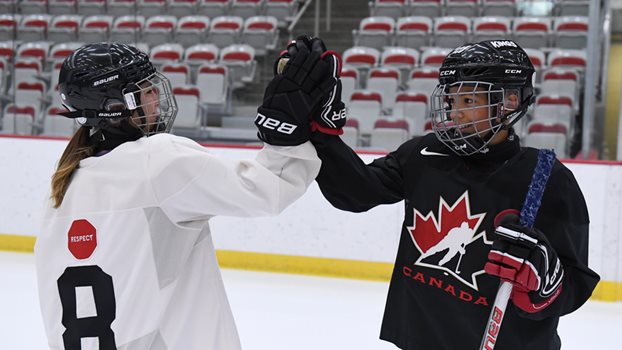
Enhancing academics with HCSA
From engaging students throughout the school day to growing the game in their community, Hockey Canada Skills Academies contribute to a unique experience for students
Creating an opportunity where students can learn new skills, build confidence and create lasting relationships is what educators like Shaune Beatty and Brett Cameron strive for in and out of the classroom.
Having the Hockey Canada Skills Academy (HCSA) available at their schools has been impactful for their students.
“The HCSA brings a lot of different opportunities for the students,” says Beatty, superintendent of school operations and supervisor of the HCSA for the Good Spirit School Division in Yorkton, Saskatchewan.
Good Spirit brought the skills academy to its schools to encourage a new culture, bring in new students and grow the game in its communities. The HCSA has been in Yorkton for four years now.
“Some of our academies have seven kids, including a few who have never played the game before,” Beatty says. “Some classes have even done equipment drives to help make the game more accessible and promote the growth of the game.”
Over 120 students across seven schools in Yorkton participate in the HCSA. For many, it allows students to engage with academics in a way that interests them.
“The feedback I’ve received is around the whole idea of engagement—the kids look forward to going to school and it breaks up the day,” Beatty says. “It’s about engagement at a different level outside of the classroom that the kids tell me they enjoy the most.”
The objective of the HCSA program is to enhance academic achievement through a balance of academics and athletics, while also improving their hockey skills.
“We’ve had two boys go through the HCSA program in our community and they have gone on to larger academies. It is great to see those that are motivated get those greater opportunities,” said Beatty.
As a former hockey player himself, Cameron tries his best to relay as much of the information he gained while playing to his students at Miramichi Valley High School in Miramichi, New Brunswick.
“I am just trying to pass along my knowledge of the game through our program,” Cameron says.
The HCSA at Miramichi Valley began in the fall of 2020 and has grown quickly. Originally, it was offered in one semester for Grades 9 and 10 and in the French Immersion program. In 2021, it was offered in French and English in both semesters. Now, there are 24 co-ed students per semester that participate in the program with different levels of ability.
“The smiles don’t leave their faces the entire time they are on the ice,” Cameron says. “Everyone has gotten better at their own pace … they are able to refine their skills and enjoy the game.”
Not only is the HCSA at Miramichi Valley teaching students fundamental hockey skills, but they also get an opportunity to get their officiating and coaching certifications, too.
“There is a true benefit to how it extends well past just hockey,” Cameron says. “It is so good to see the kids improve and work on and off the ice on their skills. The kids don’t always see it [improvement] in the classroom, but you can see the changes they are making and how they are becoming stronger and better week to week.”
The benefit isn’t just about the kids either. Cameron coaches AAA hockey in the community, and being the head instructor, along with a history and physical education teacher, he has noticed how being an HCSA operator has helped him as well.
“It makes me a better coach. All this time and effort put into the program has helped me when I coach my own team,” he says. “I am very grateful for the opportunity to teach these kids the game of hockey and all the fundamentals that come with it, but it is also about the other pieces that they get through the program as well.”
There are many special moments for the students through the HCSA, but one stands out for Cameron. Last fall, the Maritimes hosted the World Junior A Hockey Challenge in Truro, Nova Scotia, and a former HCSA player, Max Jardine, played in the tournament. All the current HCSA students went to the game to watch Jardine play at a high level.
“It showed them what they could achieve if they wanted to,” Cameron says. “It was great for our non-high-level kids to see someone at that level play.”
As the HCSA program continues to grow to over 150 schools in eight provinces, Cameron shares his advice for other operators: “The goal should be to meet the kids where they are, but not leave them there. Kids will get the most enjoyment and confidence from being taught properly and seeing improvement in their own skills over the course of the semester.”
For Beatty, the most value is when the academies build partnerships within the communities to reduce the hurdles smaller schools can face.
“Think beyond your higher skilled hockey players. Those will undoubtedly become more skilled through the additional ice time, but some of the best stories I’ve heard come from the less experienced and new players to the game,” he says. “A part of a successful HCSA is to grow the game by bringing in players that come with an interest in the game. These are students first and hockey players second, but get them in and make them players for life.”
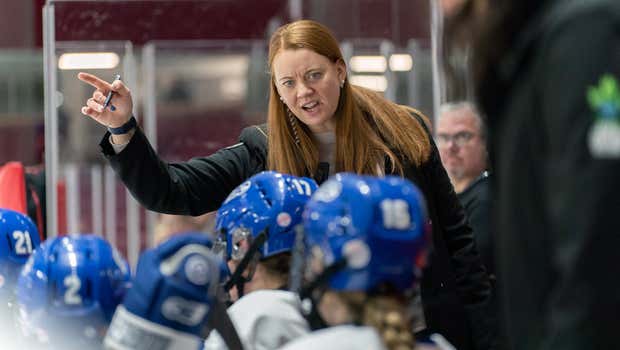
From stage lights to hockey heights
After transitioning from improv acting to coaching high-level hockey, Whitney Juszkiewicz continues to flourish behind the bench
Before the gold medal, the accolades and the countless hours behind the bench coaching high-level hockey, Whitney Juszkiewicz was an improv actor in Vancouver.
“I was on stage every Sunday throwing on an attitude, throwing on an accent, throwing on a persona and going for it,” recalls Juszkiewicz.
Born in Alberta, Juszkiewicz grew up in Edmonton and was deeply involved in hockey, attending St. Francis Xavier High Performance Hockey Academy before enrolling at the University of Saskatchewan, where she studied liberal arts and was a member of the Huskies hockey team. She then studied live performance at Red Deer Polytechnic before embarking on a career in live performance.
“I spent almost eight years in the film, television and theatre industry and I did a lot of stuff in Red Deer,” Juszkiewicz says. “My friends and I then started a theatre company (BullSkit) that specialized in improv and sketch comedy like Saturday Night Live or Second City.”
By 2012, Juszkiewicz was living in Vancouver, running her theatre company, performing improv and providing hockey lessons to kids. It was after one of those lessons that a parent asked if she had ever considered coaching hockey. After thinking it over, Juszkiewicz decided to go for it and soon found herself behind the bench of a Vancouver-area U11 boys’ team.
“I must have done a pretty good job because in my first year I won rookie coach of the year,” she says.
A little more than a decade later, Juszkiewicz is now a respected high-performance hockey coach, having been behind the bench of numerous high-level boys’ and girls’ teams throughout Greater Vancouver, and the owner of Fire and Ice Hockey Development. She has held also held various coaching-related positions with BC Hockey, briefly served as the executive director of the Langley Minor Hockey Association, became a certified Hockey Canada Skills Coach and worked as a female coach mentor with the NHL Coaches’ Association during that time.
“I put the coaching hat on and I haven’t looked back,” says Juszkiewicz, who is also a coach in the B.C. provincial program, an associate coach with a U18 Prep team at the Delta Hockey Academy and head coach of a female U15 AAA team in the Pacific Coast Amateur Hockey Association.
In February, as an assistant coach, Juszkiewicz helped Team BC win its first-ever gold medal in women’s hockey at the 2023 Canada Winter Games.
“It was a privilege to work with those young women, some of whom went on to win gold at the women’s under-18 world championship,” she says. “It was just an unbelievable experience and it will definitely be one of my all-time favourite memories as a coach.”
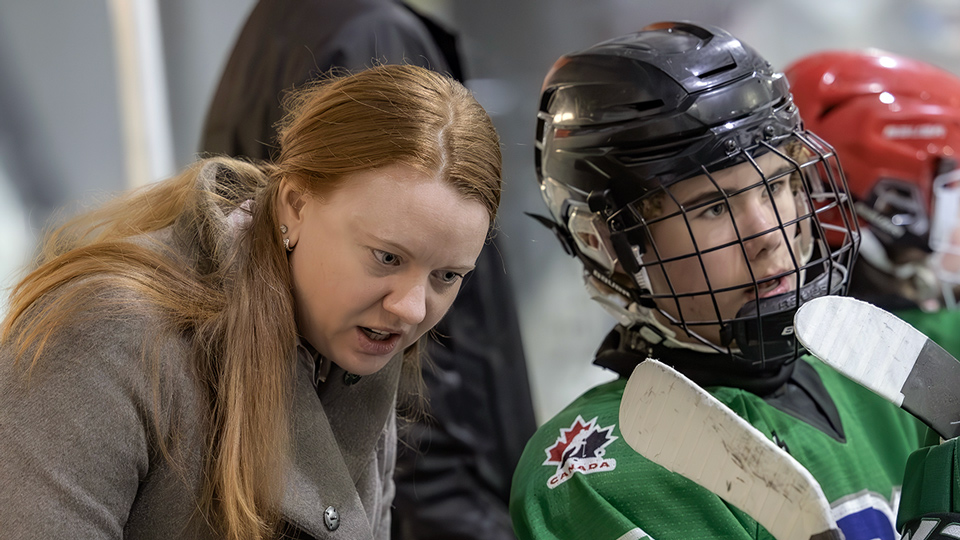
Same skills, different role
Although Juszkiewicz is no longer performing improv on weekends, she has found that many of the skills she developed as an actor have transferred over into the coaching world.
“[Coaching] hockey is reading the room and understanding that this may not be the right time to really drill in the negatives and that everyone needs a little bit of a bump, they need value,” she says.
In the acting world, Juszkiewicz says, a strong emphasis is placed on organization, understanding objectives and having everyone buy into their roles to ensure everything is successful, just like it is in hockey.
“You have the best shows when everybody understands the objective and I find the coaching world is very much like that,” says Juszkiewicz, who continues to dabble in acting, having appeared as an extra in Mighty Ducks: Game Changers. “Everyone's got a job, everyone's got a special talent that they're bringing; there is a reason why they're there and if we can just dig into those specialties and create a nice, inclusive, safe environment, we're going to have a great time.”
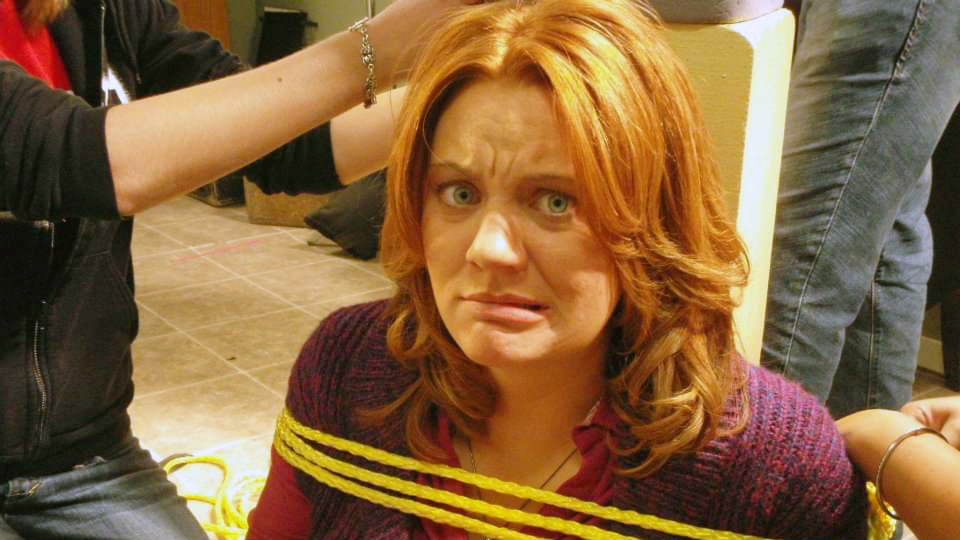
Learning and growing
Over the last four years, Juszkiewicz has been participating in Hockey Canada's Women Master Coach Developer (WMCD) program, an elite initiative that is providing 38 high-performance women’s hockey coaches with the skills they need to deliver clinics and train future facilitators and evaluators as part of an effort to increase the number of women-led coaching programs nationwide.
“It's been able to give me that extra credibility, that extra training and that extra guidance that I find I am now using with all coaches that either I work with or work for me,” Juszkiewicz says about the program, which she is set to complete later this year. “It’s been a wonderful opportunity to understand how to work with people how to train them, how are you going to create a learning environment as opposed to more of a lecture and just listen to what I have to say environment.”
WMCD participants are nominated by Hockey Canada Members and must have completed several certification and training courses to even be considered. One of the biggest benefits of being in WMCD has been connecting with 37 other highly talented women, says Juszkiewicz.
“I am one of the only women in my province in the program. If I didn't have the ability to connect with other girls in other provinces, I would feel pretty lonely and like I was on my own little island. So, I think the best part is that you are getting some of the top minds across the country in terms of female leadership and female hockey getting together and that is very empowering,” she explains. “It's extremely empowering to know that you're not by yourself.”
Juszkiewicz’s hard work and continuous dedication to her craft over the years has paid dividends. In 2021, she was named BFL Female Coach of the Year for British Columbia in the Community category, and in 2022 she was awarded the BC Hockey Development Award for coaching. She says her drive for continuous learning and growth is fueled by her desire to continue coaching in the game she loves.
“If you don't continue pushing yourself to learn and develop, you get stagnant and ultimately you get left behind.”
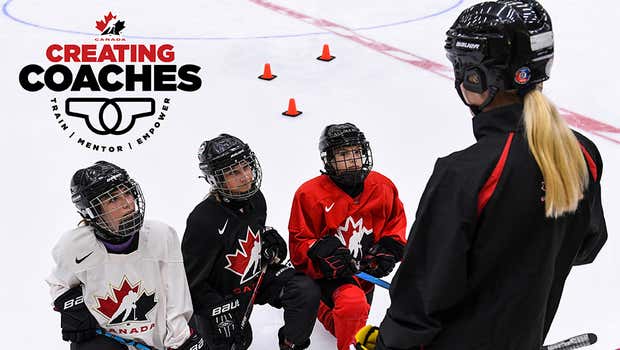
Eight student-athletes to participate in Creating Coaches program
Creating Coaches’ third cohort runs until end of 2024-25 season
CALGARY, AB – Hockey Canada and U SPORTS have announced the eight student-athletes who have been selected to join Creating Coaches, a program designed to increase the number of women coaching hockey in Canada, as part of its third cohort which will run during the 2023-24 and 2024-25 seasons.
Launched in 2021 through a partnership between Hockey Canada, U SPORTS and the Hockey Canada Foundation, Creating Coaches provides training and mentorship to current U SPORTS student-athletes who are concurrently looking to begin their coaching careers. Participants in the program serve as an assistant coach with a U13, U15 or U18 girls’ hockey team for the duration of the two seasons and receive coach education, professional development opportunities and an honorarium.
This year’s cohort includes student-athletes from eight U SPORTS women’s hockey programs across three of its conferences:
• Alexis Anonech (York University, OUA)
• Emmy Fecteau (Concordia University, RSEQ)
• Lyndsey Janes (Mount Royal University, CW)
• Madison Laberge (Nipissing University, OUA)
• Isabelle Lajoie (University of Alberta, CW)
• Sophie Lalor (University of Saskatchewan, CW)
• Sarah-Maude Lavoie (McGill University, RSEQ)
• Chihiro Suzuki (Guelph University, OUA)
“We are thrilled to welcome these eight accomplished student-athletes to Creating Coaches and look forward to working with them during the next two seasons,” said Marin Hickox, Hockey Canada’s vice-president of women and girls’ hockey. “Creating Coaches is an important program to support and develop hockey’s next generation of leaders and we are grateful to the U SPORTS coaches who nominated this talented group.
“Girls who have been coached by a woman are more likely to transition into a coaching role at the end of their playing careers, and it is our intention that this program will positively influence the recruitment and retention of girls and women in leadership roles in the sport.”
Since its inception, Creating Coaches has included student-athletes from 16 U SPORTS women’s hockey programs and all four of its conferences.
“The eight student-athletes selected to join Creating Coaches are tremendous ambassadors for hockey and university sport in Canada,” said Lisette Johnson-Stapley, chief sport officer at U SPORTS. “We have already seen the positive impact that this program has had inspiring young girls in communities across the country and we are excited for Alexis, Chihiro, Emmy, Isabelle, Lyndsey, Madison, Sarah-Maude and Sophie to begin their coaching careers while continuing to represent their universities with pride as student-athletes.”
The Creating Coaches selection committee includes representation from Hockey Canada, U SPORTS, Hockey Canada’s Members and the Hockey Canada Foundation Board of Directors.
During National Coaches Week, Hockey Canada is celebrating the positive impact that coaches have on athletes in communities from coast to coast to coast, with #ThanksCoach resources and features shared here.
To learn more about Hockey Canada, please visit HockeyCanada.ca, or follow along through social media on Facebook, X and Instagram.
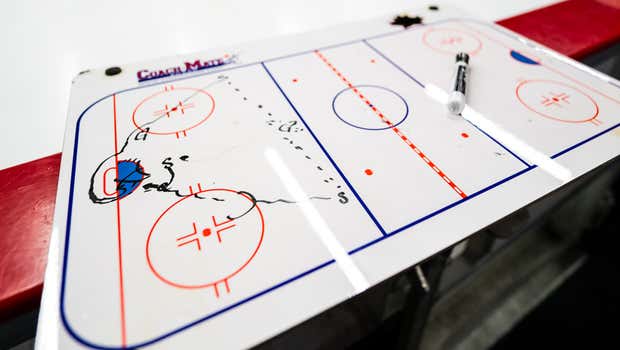
Resources for Canadian coaches
From upcoming training opportunities to ideas for skills and drills, Hockey Canada has a variety of resources available for coaches of all levels across the country
Coaches are the backbone of the hockey community. Whether you are a regular behind the bench or it’s your first season as a coach, Hockey Canada has a variety of resources available to help you succeed on your coaching journey.
How do I start my coaching journey?
If you want to get started coaching, make Hockey Canada’s National Coach Certification Program (NCCP) your first stop. This program enables coaches to build their coaching tools and knowledge of the game to work effectively with their players. Hockey Canada offers six coaching clinics and five instructional stream areas of focus.
Those looking to be trained to coach in the Community Sport stream can participate in Coach 1 — Intro to Coach or Coach 2 — Coach Level. NCCP certification is not required at either of these levels; a coach will remain trained indefinitely after completing these streams. Register for a coaching clinic or visit your Member website for more information.
Respect in Sport
The Respect in Sport Activity Leader/Coach program is an engaging and easy-to-use online training course that helps hockey coaches and youth leaders recognize, understand and respond to issues of bullying, abuse, harassment and discrimination. The course also aims to build a holistic culture of respect within the sports community and provide fundamental training tools to enable all coaches to become even better role models for the young athletes in their care.
In Canadian hockey, more than 230,000 coaches are certified by the Respect Group Inc.
Skills and drills
The Hockey Canada Network gives coaches and players the tools to succeed with drills, skills, videos, practice plans and articles on their tablet or phone. There are over 1,500 drills and more than 100 lesson plans available on the app, with more added throughout the season.
Looking for more drill inspiration? Hockey Canada will frequently post skill videos on its social channels that can be incorporated into practice plans. Search the hashtag #HCSkillsCoach and #HCGoalieCoach on X (formerly known as Twitter), Facebook and Instagram to find more drill videos to utilize on the ice.
Drill Hub is another resource available to find skills and drills for players. It is a free resource for coaches to access hundreds of drills and videos. There are also pre-made practice plans available to download, along with templates for game rosters, player stats, scouting reports and more.
Women in coaching
We Are Coaches
As a free, women-only coach program, We Are Coaches was designed to increase the number of trained women coaches in Canada in order to provide mentors and role models for young participants. The program aims to build infrastructure to support and sustain the participation of girls and women in hockey in Canada, develop women role models and leaders within the hockey community and remove barriers to coaching education for women.
Women Master Coach Developer
Launched in 2019, the Women Master Coach Developer (WMCD) program introduces more hockey coaching programs led by women. The program has equipped 38 coach leaders to not only deliver coach clinics, but also train future facilitators and evaluators in each Member.
To participate in the program, delegates can be nominated by their Member each season. Delegates are required to complete multiple trainings and certifications in the program, and upon successful completion, they will take a leadership role to optimize the delivery of the We Are Coaches program and support women coaches within their communities.
Creating Coaches
In 2021, the Hockey Canada Foundation partnered with U SPORTS to launch Creating Coaches, a program designed to increase the number of women in coaching positions in Canada. This two-year mentorship program places a focus on training, mentoring and empowering women behind the bench.
Candidates for the program are nominated by their U SPORTS coaches to participate in Creating Coaches.
How do I get further coaching support?
Are you looking for more support? Do you have a question about coaching in your community? Hockey Canada and its Members have coaching resources and helpful staff available to help you on your coaching journey.
Click here to find the coaching contact information for your Member.
Do you have more questions about coaching? Visit these Frequently Asked Questions pages to learn more about the following topics:
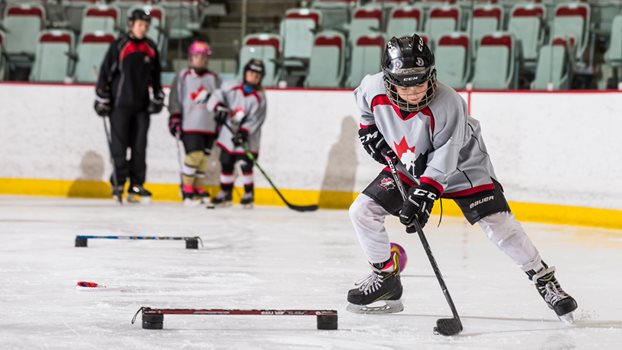
Skills to start a new semester
It’s the start of the school year for Hockey Canada Skills Academies, and finding different skills to evaluate players is key for planning lessons through the semester
The new school year has arrived, and students in the Hockey Canada Skill Academy (HCSA) program are excited to be back in the classroom and on the ice. After a summer away, the beginning of the semester is the perfect time to understand the skill level of students so lead instructors can customize their lesson plans to match the need of participants.
“At the start of the year, it’s all about evaluating a variety of skills to get a sense of where your players are at, from skills they are good at [to] skills they are challenged with,” says Corey McNabb, director of NextGen development at Hockey Canada. “That helps to build out your plan moving forward from there as far as what you want to teach and how you want to teach it.”
What types of skills should be included in the evaluation? Basic skating techniques and puck control techniques are good to include because those skills are used in a variety of drills and during games. Going over these techniques in small-area settings is also beneficial.
Instructors can evaluate some skills based on the player’s position. For example, defenders can begin with skating skills, then add in the ability to transition and pivot before finally adding in using a puck and passing it between teammates.
“I think where we focused was not necessarily skills, but game transferable skills [were] top of mind [when developing evaluation plans for athletes],” says Dean Seymour, manager of NextGen/player development for Hockey Canada.
There are also some off-ice evaluations that instructors can do at the beginning of the semester. For example, the instructors could lead students through a 40-metre sprint, a 5-10-5 agility test, a standing long jump or a medicine ball throw. Each of these evaluations can be used as benchmarks as classes progress throughout the school year.
HCSA participants come from a variety of hockey backgrounds, with some students who have played for years and others who are new to the sport. The benefit of working on basic skills is that the drills are applicable to every participant.
“The older you get [or] the higher the level, you’ll just be able to execute them better,” McNabb says. “But there’s not [many evaluation skills] that I would say you can’t do with minor hockey age players.”
When it comes to lesson planning, McNabb recommends focusing on the key teaching and evaluation points, so instructors are looking at specific items within a drill rather than students completing the drill without a clear purpose. Planning out the semester in advance can also help keep instructors on track for achieving their success goals.
“Create a schedule and stick to that schedule, and try not to skip too far in advance,” Seymour says.
If students at an HCSA are involved in hockey outside of the program, it’s good practice for instructors to have open communication with local hockey association coaches.
“Talk to the coach and say, ‘Hey, what do you suggest? What do you think these [players] need to work on?’ They can try and collaborate that way,” McNabb explains.
For HCSAs with students that are new to the sport, repetition of drills over the semester can be a great way to work on basic hockey skills.
“Almost all drills involve turning left, turning right. They’re skating, there’s passing, they’re shooting. They are all designed to keep kids active,” McNabb says. “I think kids will get better just by doing [drills].”
Looking for inspiration for skills and drills to include in an HCSA practice plan? The Hockey Canada Network app has over 1,500 drills and more than 100 lesson plans to give coaches and players the tools to succeed. Drill Hub is another resource available to instructors, with access hundreds of drills and videos for free.
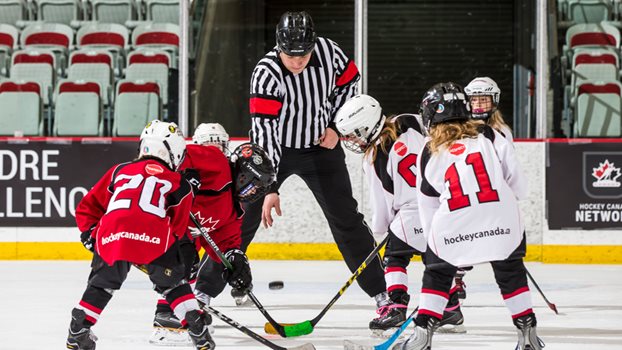
Support during the school year
From sharing resources and drills to additional coaching certifications, support is available as Hockey Canada Skills Academies prepare lesson plans
School is back in session, and that means another Hockey Canada Skills Academy (HCSA) season is underway. As students return to the classroom and to the ice this school year, here are a few resources instructors can incorporate into their HCSA curriculums.
Skills and Drills
The Hockey Canada Network app gives coaches and players the tools to succeed with drills, skills, videos, practice plans and articles on their tablet or phone. There are over 1,500 drills and more than 100 lesson plans available on the app, with more added throughout the season.
Drill Hub is another resource available to instructors to find skills and drills for students. It is a free resource for coaches and instructors to access hundreds of drills and videos. There are also pre-made practice plans available to download, along with templates for game rosters, player stats, scouting reports and more.
Looking for more drill inspiration? Hockey Canada will frequently post skill videos on its social channels that can be incorporated into practice plans. Search the hashtag #HCSkillsCoach and #HCGoalieCoach on Twitter, Facebook and Instagram to find more drill videos to utilize on the ice.
Coaching Certification
All HCSA lead instructors need to be certified in the Respect in Sport for Activity Leaders program. They also need to have the Coach 2 – Coach Level from the National Coach Certification Program (NCCP) or, at a minimum, be trained in two of these instructional stream clinics: skating, developing defencemen, skills or small-area games.
However, there are opportunities to expand coaching certification to a higher level, including taking more instructional stream clinics or NCCP coaching programs such as Development 1 or High Performance 1. Hockey Canada’s coaching web page explains the difference between the levels and provides example coaching pathways. Instructors should connect with their Hockey Canada Member for more information on higher-level coaching certification.
HCSA Members
For more resources, be sure to log into the HCSA account on HockeyCanada.ca. Once logged in, instructors will have access to the HCSA curriculum, practice plans for on- and off-ice activities, support tips and links to previous HCSA seminars.
With over 150 HCSAs across the country, it is encouraged to reach out to lead instructors at other schools to share insights and tips. Local hockey associations in the area can be another great resource as lesson plans are finalized. For further support throughout the school year, contact Drew McLaughlin, manager of Member engagement and school programs.
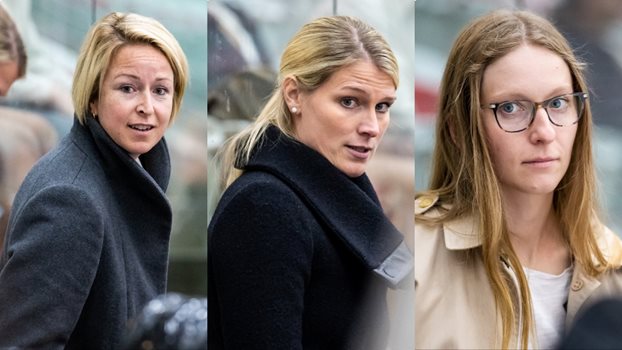
If you see it, you can be it
Growing the game beyond the ice, Courtney Birchard-Kessel, Tara Watchorn and Stefanie McKeough made history as the first all-women coaching staff in under-18 program history
On the ice, Canada’s National Women’s Under-18 Team completed a three-game sweep of the United States in its summer series for the first time since 2007, but behind the bench, the coaching staff was making a little history.
Head coach Courtney Birchard-Kessel and assistants Stefanie McKeough and Tara Watchorn became the first all-women coaching staff in the history of Canada’s women’s U18 program. The result against the Americans was terrific, but the impact the series will have on growing women’s hockey goes beyond the ice.
“We’re in such a good time for women in coaching positions,” says Watchorn. “With pioneers like Hayley Wickenheiser and Caroline Ouellette, it’s great to see that women are starting to get in on the coaching side now and there’s a path to making coaching a career, which was really tough before. It’s really cool to see that transition where a wave of players who have already had a hockey career now able to move into coaching.”
To add to the accomplishment, all three members of the coaching staff are alumnae of National Women’s Program, having shared the ice together at camps and events over the last decade and a half, including a golden experience with Canada’s National Women’s Development Team at the 2011 MLP Cup, the only time the three wore the Maple Leaf together.
Combined, the three played 183 international games; Birchard-Kessel appeared in three IIHF Women’s World Championships, winning gold in 2012, Watchorn was an Olympic gold medallist in 2014 and played at three women’s worlds, and McKeough was part of the Canadian contingent at the 2009 IIHF World Women’s U18 Championship.
So coming back to the national program and having a reunion of sorts behind the bench meant a little bit extra for the trio.
“Between the three of us, our paths have crossed so many times throughout our own playing careers, and we have a lot of shared experiences and values we learned along the way,” Watchorn says. “For the under-18 age group, they’re so young and for a lot of them, it’s their first high-performance environment. So, for us to be able to understand and anticipate those stressors and telling them to focus on just being present, enjoying the time with teammates and making them better, you’re always going to play better.”
Watchorn has always wanted to be a coach. Even during a successful playing career that included Olympics, women’s worlds and hoisting the Clarkson Cup with the CWHL’s Boston Blades of the CWHL in 2015, Watchorn knew she wanted to pass on the positive experiences she’s had in the game.
“I am so fortunate to be part of cultures and teams that truly changed my life,” says the Newcastle, Ont., native, who is the first-ever head coach of the women’s program at Stonehill College, “so my hope is to create that environment and culture for other young women who can come through and be inspired [and] challenged, and become leaders and people who impact the world.”
Although coaching isn’t always the plan for players, hockey sometimes finds a way back. After hanging up her skates after a five-year college career at the University of Wisconsin (which included an NCAA national title in 2011), McKeough thought coaching was one of the last things she would be doing with her free time.
But the game eventually took her to Sweden, where she was able to get a taste of coaching and was bitten by the bug. To this day, McKeough admits it continues to surprise her every time she walks into the rink as a full-time coach.
“Hockey players are humans first,” the Carlsbad Springs, Ont., product says. “I learned through coaching that we have to help the person before helping the hockey player, and being able to be there for somebody is something that motivates me when I show up at the rink every day.”
As an assistant coach with the University of Ottawa, McKeough gets to work and learn from veteran U SPORTS coaches like Vicky Sunohara (Toronto), Rachel Flanagan (Guelph) and Gee-Gees bench boss Chelsea Grills. They’ve been able to set examples for McKeough previously as a player and now as a coach.
“Vicky was actually one of my coaches at my first U18 camp and Rachel was an assistant coach during one of my years on the under-22 team, so now that I get to work with them, I’ve been able to gain a more deeper respect for what they do as coaches.
“By having those ’If you see it, you can be it‘ situations, I’ve been able to continue to build those relationships with other coaches and the players.”
The growth and visibility of women in coaching and leadership positions continues to grow. Just this summer, Hockey Canada alumna Jessica Campbell was hired as an assistant coach by the AHL’s Coachella Valley Firebirds, longtime national team defenceman Laura Fortino took on the same role with the OHL’s Hamilton Bulldogs, and 2022 Olympic gold medallists Marie-Philip Poulin and Rebecca Johnston took on player development roles with the Montreal Canadiens and Calgary Flames, respectively.
“Diversity in leadership is so valuable,” Watchorn says. “For people to bring different backgrounds, and to be able to relate to the players, it’s just so important. If you see it, you can be it.”
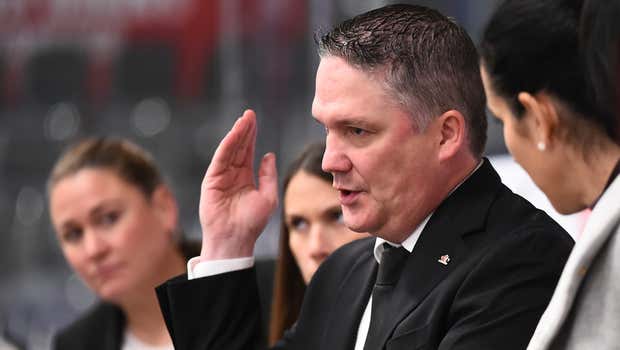
In my own words: Troy Ryan
The gold medal-winning head coach reflects on how he got involved in the women’s game, what makes Canada’s National Women’s Team so special and the best advice he’s received
My first introduction with the women’s game was many years ago when I was playing hockey at the University of New Brunswick in the mid-1990s. They didn’t have a women’s varsity team, but they had a club team, and every once in a while, the team needed extra support with coaching. So, for a brief time while I was playing, I jumped on the ice to help.
After that, I started to build my own coaching career on the men’s side. I was actually in Calgary working at Hockey Canada’s under-17 camp and I received a call from Darren Sutherland at Hockey Nova Scotia. He said they had to make a last-minute coaching change for their Canada Winter Games women’s hockey team, and called me first to see if I had anyone I would recommend. I think I gave them three names, but two weren’t available and one wasn’t interested, so they called me back and just asked me if I would be interested. I jumped at the opportunity and I coached at that Canada Winter Games in 2015.
The following year, that group of women I coached at the Canada Winter
Games got together and wrote a letter to Hockey Nova Scotia to recommend me
or nominate me for a coaching award, and I ended up winning that award.
It’s kind of a cheesy part of the story, but they were playing on my
heartstrings a little bit and I got hooked to women’s hockey right away.
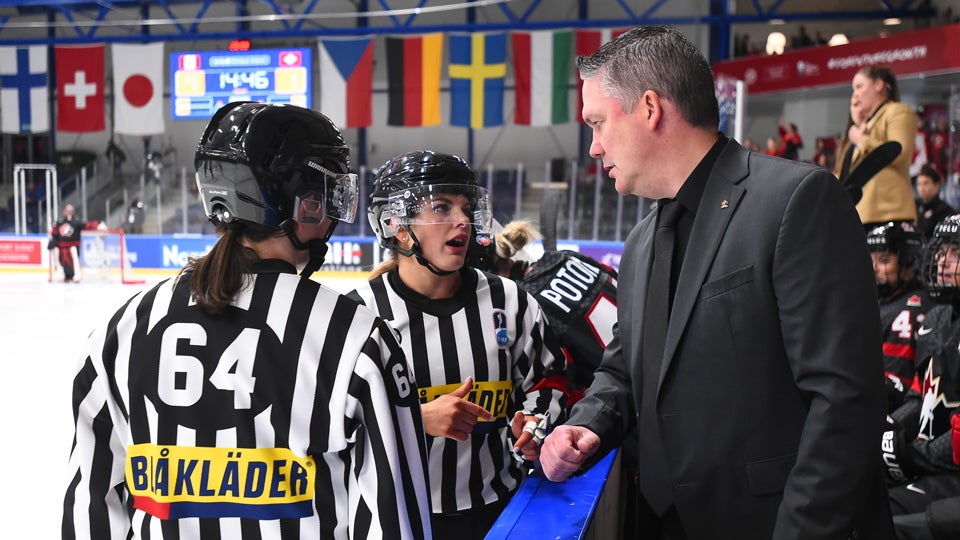
One of the biggest reasons why I love coaching in women’s hockey is the passion they have for the game. The other part is just the high-performance side of it—when you’re coaching these women, they are true professionals. They invest almost all their time in their craft. But it really comes down to their passion. The passion they have for the game, the passion they have to play for their country and the passion they have for each other really separates them from anybody else that I’ve ever coached. They are just a special group of athletes.
I honestly feel spoiled all the time working with Canada’s National Women’s Team. Every day is fun working with these players and staff. I think the biggest thing driving me as a coach is I still think this group has room to grow. I think we’ve taken huge strides in the right direction. We’re a better team now than we have been in the past. They genuinely care about each other’s success, and they share in those successes. I just still think there’s room to improve, and if I didn’t believe that, I wouldn’t be doing my job.
Some of the best parts about coaching this team are things no one would ever see. Like when you have a video session with an athlete and you bridge a gap with them and you can see them excel in that area on the ice. It’s just that little look you get when they come off the ice after they’ve accomplished something that you’ve discussed with them. Those moments to me are the real special ones. The wins and all that, that’s obviously fun, but a lot of the times they’re more of a relief than they are a high moment. It’s the little moments along the way.
I remember one special moment at the Olympics in Beijing. Because of COVID-19, the athletes had to put the medals around each other’s necks. That was just so unique and special. You look at each one while they’re doing it, and you just have a story in your head for each of those people. Maybe it’s an obstacle they had to overcome to be in that situation. Several of them had been released from the team prior to world championships, and they did what they could to get back into the mix. So, I remember just almost checking out mentally during that five-minute span of the medal ceremony and just reflecting on some of the cool stories that each person had to overcome to get to that moment. To see them getting an Olympic gold medal around their necks from one of their teammates was a pretty cool experience.
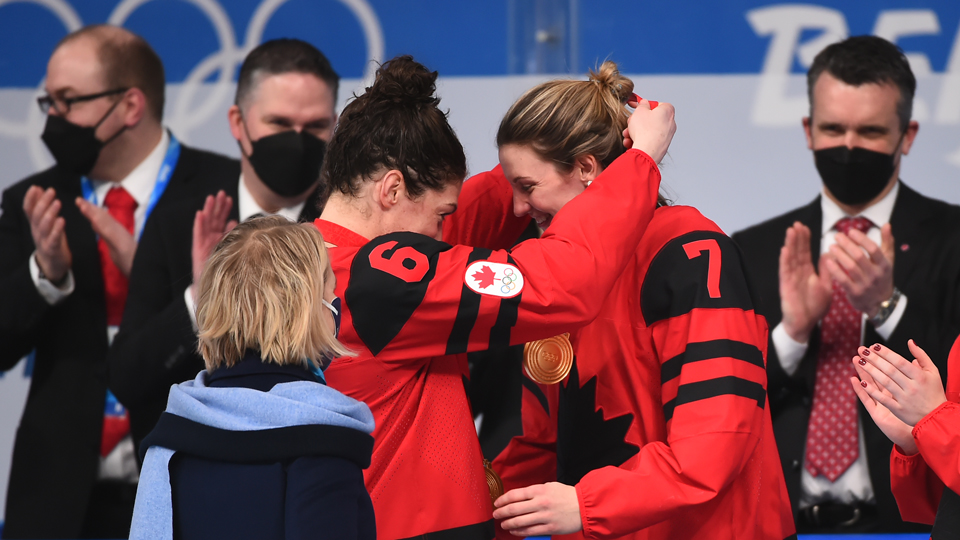
Mike Johnston coached me at the University of New Brunswick. He’s actually Rebecca Johnston’s uncle, which is funny. When I first started coaching, he told me no matter what I do in hockey, always have your province’s back. A lot of people, when they first get that opportunity in U18 or junior hockey, they forget about their provincial program. I looked up to him so much when I was younger, so I always made sure that no matter what job I had in the game, if Hockey Nova Scotia ever reached out to me, I’d be there to volunteer and to help. If I had went along my route of coaching in junior hockey or university hockey, I never would have had the experiences that ended up benefitting me the most with this job. The best experiences I had with my provincial Member were participating in short-term events, working with the best players and coaches, and gaining more high-performance experience.
Another good piece of advice I got a long time ago was simple—meet people where they’re at, even at the national team level. There are athletes coming in that are four-time Olympians, then there are some that are just hoping to get centralized or make a world championship team. As a coach, it’s so important to understand the different dynamics, and the dynamics in the women’s game tend to be much different than in the men’s game.
When I first started coaching, one of the typical questions people asked me was the difference between coaching men and coaching women. I think a lot of people make a mistake in trying to put an umbrella over their group. I always thought good coaches coach their athletes as individuals. Take the time to get to know your athletes and know what goals they have and what they want to achieve. Right now, we are trying to build our program to win a gold medal at the 2026 Olympic Games. In order to get there, I think we need to really take care of a lot of the individual stories that are involved on our team. That will be a bit more of my focus in these first few years of the quad as we get ready for 2026.
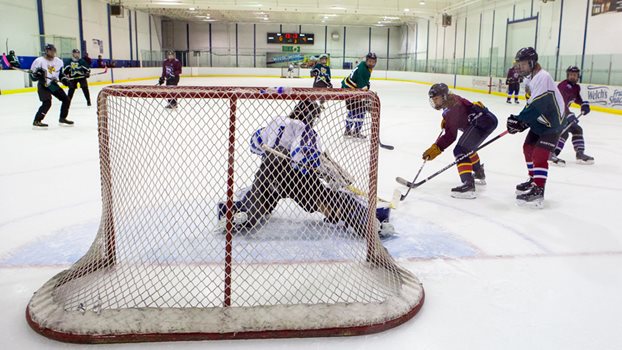
Embracing the ‘old normal’
With a return of normalcy across Canada, Hockey Canada Skills Academies were excited to get back to regular programming for students across the country
Throughout the 2021-22 school year, a return to normalcy grew across Canada – and with it a clear majority of Hockey Canada Skills Academy (HCSA) school programs had the greenlight to return to pre-2020 practices.
Jaydee-Lynn McDougall, who just completed her first year as an educator at Technical Vocational (Tec-Voc) High School in Winnipeg, Man., is thrilled her year as dance instructor, physical education teacher and HCSA lead was a journey with very few restrictions.
“Where I picked the program up, we were at a point in Manitoba where you no longer had to wear masks on the ice, so it worked out very well,” the 26-year-old says. “The last two years, they had not been on the ice even though they could sign up for the skills academy, so they have been missing that integral part. That’s why they signed up for the class, right? To be on the ice to improve their hockey skills.”
The school year in many ways represented a refreshing return to the ‘old normal’ that existed before COVID-19 entered public consciousness.
Greg Masterson, the supervisor of learning services with the Calgary Catholic School District (CCSD), concurs that the return to normalcy has been great.
“It has been wonderful for our students and our coaches to be back on the ice with no more restrictions,” he says. “You can tell there is a lot of excitement on the ice during the classes.”
Resumption of classic HCSA programming – two on-ice sessions, dryland training and classroom work per week for most academies – has once again spawned the benefits long associated with these programs since its institution during the 2000-01 school year: heightened academic performance.
“The Hockey Canada Skills Academies promote student wellness, and when students are feeling well, they are ready to learn,” says Masterson. “I noticed when I was a vice principal at how organized these students were away from rink and they demonstrated an appreciation of how privileged they are to have this opportunity to participate in the skills academy.”
McDougall said it was evident that the 20 Grade 10-12 HCSA students she mentored transferred their discipline and focus from the ice and gym into the classroom.
“I think the program really helped students become re-engaged in school and perhaps re-engaged in [life] in general,” McDougall says. “I had some students join the academy later in the year who were not doing well academically and after they joined in November they improved in their classwork, passed all their courses and are moving on to the next grade.”
The first-year teacher says she was heartened to see so many of her HCSA students actively participate in Tutor Friday hours at Tec-Voc. She’s observed the students approach this opportunity to dive into their academics with a similar rigor to their efforts to improve their edgework, puck-handling and shooting.
Inclusivity and accessibility are other celebrated hallmarks of the HSCA learning model. McDougall, who played Prep hockey at St. Mary’s Academy during her high school years, experienced these rewarding dimensions of the program during her rookie instructor year.
“It was really interesting coming into this program. I did not know what to expect in my first year,” she says. “I had students playing in a league outside of school and I also had a Grade 11 student who had never been on skates because of COVID-19. It was incredible to see the skill development there. The gap got smaller and smaller throughout the year because of the amount of times we were able to go on the ice and practice those skills.
“I think the students when they are together all year really get to know each other and accept each other. They were all helping one another develop their skills in the stages they needed. We had more split drills at the beginning of the year where we would do skill work on one side of the ice and challenges on the other side. By the end we had our practices all together.”
With another year in the books, there’s lots to look forward to in 2022-23. Both Masterson and McDougall expressed a keenness to further enhance accessibility and inclusivity with increased sledge hockey sessions for students. Until then, there’s lots to celebrate about the successes of the 2021-22 school year.
For more information: |
- <
- >
